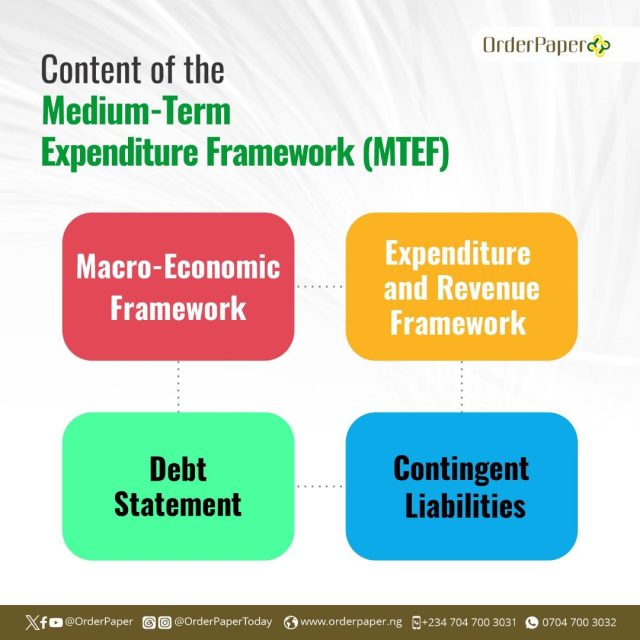The House will pass on the document to its relevant committees on MTEF to review and make recommendations that will form the foundations of the 2024 budget.

The House of Representatives is set to receive the Medium-Term Expenditure Framework (MTEF) for 2024 – 2026 fiscal year from the federal government.
This is in accordance with the stipulations of the Fiscal Responsibility Act (FRA) 2007, which mandates the federal government to submit the MTEF four months before the end of the fiscal year, for review and approval.
The MTEF is a crucial part of the annual budget preparation cycle, as it provides a mid-term estimate of the country’s budget and expenditure. It is a multi-year budget structure that spells out the estimate of resources available for spending, government expenditure, revenue targets, and ensures an efficient use of public funds.
The 2024-2026 MTEF will provide guidance to Ministries, Departments and Agencies (MDAs) of the Federal Government in the formulation of policies and selection of projects and programmes to ensure economic development upon approval.
As soon as it is presented to the green chamber, the lawmakers will refer the document to a joint committee, who will in turn, review, and make recommendations.
The committees involved – Committee on Finance, Committee on National Planning and Economic Affairs, and the Committee on Aids, Loans and Debt Management – are expected to collaboratively review the MTEF, and present their findings to the House before passage.
The leadership of the committees
The leadership of these three committees, alongside 131 others, were announced in July this year, to carry out oversight functions and other legislative activities on behalf of the 10th national assembly.

Committee on Finance:
James Falake is the chairman of the House of Representatives Committee on Finance. He represents Ikeja Federal Constituency in Lagos state and belongs to the All Progressives Congress (APC).
The lawmaker is regarded as a prominent member of the ruling party and has been a member of the House since 2011.
Faleke was also the chairman of the Committee on Finance in the previous assembly, and chairman of the Committee on Anti-Corruption, National Ethics and Values in the 8th assembly.
He previously served as a member of the House committees on Public Procurement, MDGs, Interior, Public Accounts, Science and Technology, and also served in the Committee on the Petroleum Subsidy Probe.
His deputy is Seidu Musa Abdullahi (APC, Niger). Abdullahi represents Bida/Katcha/Gbako federal constituency.
He was also previously deputy chairman of the committee.
He was first elected into the House in 2019 and served as the secretary of the Niger State caucus in the 9th assembly.

Committee on National Planning and Economic Affairs:
Isiaka Ibrahim (APC, Ogun) is the chairman of the Committee on National Planning and Economic Affairs.
He represents Ifo/Ewekoro Federal Constituency in Ogun state. Ibrahim was elected into the House in 2019. In the previous assembly, he served as the chairman of the committee on Ecological funds.
Clement Jimbo (ACP, Akwa Ibom) is the deputy chairman of the committee. He is a first time member of the House.

Committee on Aids, Loans and Debt Management:
The leadership of the committee on aid, loans and debt management is held by Abubakar Nalaraba (APC, Nasarawa).
The lawmaker represents Awe/Doma/Keana federal constituency in Nasarawa, and is currently doing his 2nd term as a member of the House. In the previous assembly, Nalaraba was the Chairman of the Committee on Pilgrims Affairs.
The deputy chairman of this committee is Lanre Okunlola (APC, Lagos). He is the lawmaker representing Surulere Federal Constituency II in Lagos state.
What to expect
The joint committee is integral to the passage of the MTEF. It is expected to scrutinise the document once it is referred in order to ensure that the fiscal policies are consistent and effective over the medium term. To achieve this, the committee is expected to organise an interactive session with major stakeholders, government agencies, departments and ministries.
The Reps committees are to interrogate the documents and ensure that it gives adequate consideration to the country’s current economic realities.
It should make recommendations that address the harsh inflationary trends, naira depreciation, huge debt profile, high unemployment rates, and the poor living conditions of Nigerians.
Its assessments and recommendations will be made using parameters such as the GDP growth, projected borrowings, retained revenue, debt service, statutory transfer, daily oil production, and the benchmark oil price, as contained in the MTEF.
At the end of the exercise, the committee will present their recommendations to guide the house in approving the document.



